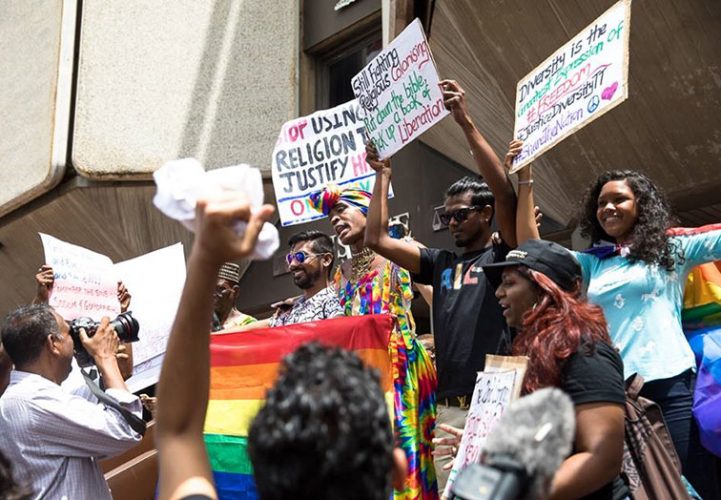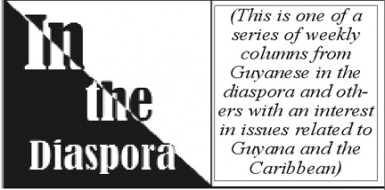Nikoli Attai is a PhD candidate in Women and Gender Studies at the University of Toronto. He holds a BA in Media and Communication and an MPhil in Cultural Studies from the University of the West Indies. His research explores the efficacy of Canadian human rights investments in the Caribbean, and theorizes the various ways that queer Caribbean people negotiate and resist dominant ideas about acceptable (hetero) sexuality. Nikoli has conducted extensive research in Barbados, Guyana, Jamaica and Trinidad and Tobago.
On April 12th, 2018, Trinidad and Tobago’s LGBTQIA community reminded the region that, above all else, love must prevail. We stood in solidarity to support a brother as he fought to have the country’s sodomy laws that criminalize consensual anal sex between adults removed from the legal books. Some of us stood in solidarity from afar, holding each other’s hand in virtual space as we provided support and care in various unnamed ways. Our eyes remained fixed on our social media timelines, soaking in the pore-raising events as they unfolded. Some of us stood outside the Hall of Justice and sang the country’s national anthem: that “every creed and race can find an equal place” in Trinidad and Tobago. Some of us held placards with messages of love, even as a member of the Jamaat Al Muslimeen called one of us, a lesbian activist, a “(expletive) bitch,” spitting in her face. After tense anticipation, High Court judge, Justice Devindra Rampersad ruled that Sections 13 and 16 of the country’s Sexual Offences Act (1986) are “unconstitutional, illegal, null, void and invalid and are of no effect to the extent that these laws criminalise any acts constituting consensual sexual conduct between adults.”
The Jones V T&T case was filed in February 2017 and slowly engaged the public’s attention as it moved quickly through the judicial process in just over one year. While the proceedings initially had low public interest, on April 6, 2018, a Christian non-governmental organization, T&T Cause, whipped the country into a state of pandemonium when it held a mass protest through the streets of Port of Spain. Religious evangelical leaders spewed the typical homophobic rhetoric of the destruction of Sodom and Gomorrah, about the laws of God being the laws of the land, and of impending disaster when the gates of hell fly open. And, of course, these sentiments have incited intense anxiety among some members of society who continue to use deeply limiting understandings of our sexualities and gender identities to determine the limits of our morality.
In light of such easy misunderstandings, it is important to state clearly what Jones and the LGBTQIA community are fighting for. Like Guyana, and all of the Caribbean impacted by British colonization (except The Bahamas, which repealed its sodomy laws in 1991), anal sex between consenting adults is a criminal offence in Trinidad and Tobago. Section 13 of the country’s Sexual Offences Act stipulates that a person is guilty of buggery and liable on conviction to imprisonment for 5 years if committed by minors, 25 years if committed by consenting adults, and to life if committed by an adult on a minor. Section 16 further criminalises acts of “serious indecency” on or towards another person for up to fifteen years imprisonment. Serious indecency has been variably understood as activities other than heterosexual vaginal intercourse, from which persons may derive sexual pleasure. As Justice Rampersad pointed out in his judgment, while “Section 16 goes on to exempt any such acts, conducted in private, by three classes of persons…[p]ersons of the same sex who engage in such acts are not exempted and as such may be liable to imprisonment if convicted.” These laws have resulted in heightened vulnerability for gay men, lesbian women and trans people.
These laws have been cemented into the country’s constitution by the pioneers of independence who, in their wisdom, saw it necessary to retain legislation that pre-dates the formulation of Trinidad and Tobago’s constitution in 1976 via a “savings clause.” Such a clause protects pre-independence laws from challenge, even if they contravene the spirit of the constitution that seeks to guarantee fundamental rights to all citizens. Jones argued, however, that this legislation must be addressed because it violates his dignity, denies him privacy, denies him a right to form a family, and treats him unequally in an irrational manner. Such sentiments are echoed in Justice Rampersad’s ruling that “the beliefs of some, by definition, is not the belief of all and, in the Republic of Trinidad and Tobago, all are protected, and are entitled to be protected, under the constitution…this court must and will uphold the Constitution to recognize the dignity of even one citizen whose rights and freedom have been invalidly taken away.”
As expected, religious extremists are preaching their dogma of religious hatred
towards LGBTQIA people since Jones’ challenge was filed. But what does this judgement mean for those of us who dare to believe in other ways of being in our world? Trinidad and Tobago, like the rest of the region, is at an important moment where histories of colonization are colliding with more nuanced understandings of what it means for people to truly understand and access their innate sexual desires in ways that move beyond limiting conceptions of compulsory heterosexuality. Despite a popular belief that the community should continue to be oppressed, this legal challenge simply reminds us that it is time to question and reflect on such inhibiting ideas that continue to cloud judgement. For instance, as an interested party, the orthodox Hindu organization, the Sanatan Dharma Maha Sabha, submitted concerns that homosexuality contravened sacred understandings of sexuality and that decriminalizing the buggery laws would go against the teachings of the Bhagavad Gita, the Mahabharata and the Manusmriti. The Trinidad and Tobago Council of Evangelical Churches also suggested in their submission against the claimant that the court needs to consider the link between homosexuality and HIV/AIDS, and argued that decriminalizing anal sex would result in a proliferation of the virus. Outside of the courtroom, we are witnessing similar sentiments by religious groups that are making bizarre claims in the local media, that the decriminalization of anal sex threatens traditional family values. Evangelical protestors have even likened same-sex sexual practices to cancer, arguing that the LGBTQIA community should not have the same rights as “normal” people. Justice Rampersad put this issue to rest in his explanation that the notion of “traditional” family is an evolving concept, with the long presence of single-parent families disrupting conservative ideas of the composition of Caribbean families. He also reminds us that there is no credible evidence to support claims about HIV/AIDS being a “gay disease.”
These debates are quite frankly overdone and we need to spend less energy on enabling this type of rhetoric. Instead, I want to call attention to the fact that this monumental judgment, and the shows of solidarity that it received locally, regionally, and in the Caribbean diaspora, is possible because of the long histories of activism, organizing and community-making on the ground. Important relationships developed with activists across the region have also helped to strengthen efforts to address the community’s multiple needs over time. And, of course, other watershed moments in the region’s legislative history have paved the way for legislative reform in the various countries. For example, the on-going cross-dressing case being contested by Guyana’s trans communities challenges the ways that “improper use” is vaguely interpreted in the Summary Jurisdiction (Offences) Act Chapter 8:02, and in the final court of appeal ruling that upholds Justice Ian Chang’s ruling in 2013. In Belize, Caleb Orozco successfully challenged the Section 53 of the country’s Criminal Code of 1981, which criminalized “carnal intercourse against the order of nature,” and criminalized anal sex between consenting adults.
Although these cases have received significant attention, activists have also worked tirelessly to strengthen LGBTQIA people’s ability to stand together. This process however, has been long and uncertain at times. I remember joining the local group CAISO: Sex and Gender Justice in 2011 to deliver information packages to government representatives to sensitize them about the need for a comprehensive national gender policy that ensures safety for all citizens regardless of race, class, sexuality and identity. At that time, only a handful of persons responded to a call for community support. Public support was also minimal in 2012 when the group launched its Add All Three campaign, advocating for the inclusion of Age, HIV status and Sexual Orientation in Trinidad and Tobago’s Equal Opportunities Act. Again, only a handful of activists protested outside the Parliament. What we witnessed in the days leading up to Jones’ victory is a culmination of these years of labour that instilled a spirit of resilience in the hundreds of supporters who felt confident to stand in solidarity. We sent a signal to the society we will no longer accept the hateful rhetoric being spewed by mostly extremist, conservative religious bodies in light of these developments.
Much more activism happens on the community level by numerous groups who prioritize other important needs. With limited resources, small organizations have established deep roots in the country, providing emergency relief to persons who have been evicted from their family homes. They have been helping persons in critical need of health care, who need safe spaces to build community, and who simply want to find productive ways of negotiating, navigating, and resisting dominant ideas of compulsory heterosexuality. Members of the Alliance for Justice and Diversity are reminding Trinbagonians to help “manage the uptick in threats of violence, and the fear and evictions in the immediate days after the historic ruling.” They have renewed their call to political and religious leaders to join public appeals for “sharing the nation.”
I reflect here on these messy dynamics as a challenge to confront the bigotry, fundamentalist religious sentiment, and gross misconceptions that continue to inhibit our capacities to share space in the region. The possibilities that this moment presents in recalling we understand belonging to our nation and region is significant, especially when claims to citizenship rest upon our proximity to “the norm.” I wonder about the “what’s next?” in these dynamics, especially when people are forced to revisit their understandings of how we exist, or are made to exist, alongside each other. I hope that we will feel emboldened to learn more about the facts, rather than push agendas steeped in ignorance. Today, I remember bundling garbage bags filled with my friend’s life into my car after he was chased from his family’s home when he told his mother that he was gay, and after the pastor of his church refused to provide shelter because he was unable to proclaim that he will no longer be gay. I remember my friend who was befriended by a man on Facebook, only to be stabbed 13 times by him, and left for dead. I remember my friend who was repeatedly subjected to “pray the gay away” in front of an entire congregation and eventually committed suicide. But I also remember friends who are on the ground fighting these atrocities, supporting each other and building community. In the words of popular trans activist and celebrity Mizz Jinnay from Trinidad and Tobago, I remind you that “Your love not better than mine, my love not better than yours – Love is Love!”

